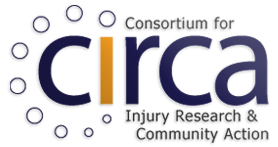Research
CIRCA faculty participate in a wide range of research areas. We periodically highlight specific areas in this section.
Youth Violence and Child Maltreatment
CIRCA faculty are on the forefront of youth violence research. Dr. Fabio is an epidemiologist on the forefront of social epidemiologic approaches to understanding violence. Dr. Fabio’s main research interests include understanding social causes of violence as well as community and individual level causes of violence trends. He has published important works in leading journals including the American Journal of Epidemiology and the American Journal of Public Health. He has led national symposiums on how social factors affect violence and has been invited to speak across the country. The NIH, the CDC, the Department of Defense and other institutions have funded his work. Most recently, Dr. Fabio has been examining trends in youth violence to determine the role of social influence on violence in adolescents. Currently he has a CDC funded project to assess changing violent crime rates in Pittsburgh neighborhoods undergoing large scale economic development. He is also funded to assess the tracking of violent crimes in the city of Pittsburgh.
Dr. Kolko’s work primarily deals with the study and treatment of disruptive behavior disorders and children’s antisocial behavior, including child physical abuse and related forms of maltreatment, and adolescent depression/suicide. Much of his work is devoted to dissemination and implementation efforts designed to adapt and then transport effective interventions for these clinical problems to various community settings or systems serving children, youth, and families. Resources to Enhance the Adjustment of Children (REACH) is a research study funded by the NIMH designed to examine and improve the way that children with disruptive behavior problems (and their families) receive mental health services. Services for Kids in Primary Care (SKIP) is an NIMH funded research project studying the benefits of specialized behavioral health services provided directly through a primary care setting.
Many CIRCA faculty study healthy aging, including falls in the elderly. The Center for Aging and Population Health (CAPH) strives to generate new solutions to the challenges of an aging society through the conduct of population-based research that promotes healthy aging, longevity, and prevention of disability. Building on the resources of the University of Pittsburgh’s Department of Epidemiology and its funding as a CDC Prevention Research Center, the CAPH orchestrates epidemiologic and public health research on aging. These efforts are collaborative within the University and the community, and engage older adults as valued resources in society. The Center is directed by Anne B. Newman, MD, MPH, Professor of Epidemiology, and co-directors, Jane A. Cauley, DrPH, Professor and Vice Chair for Research, Department of Epidemiology, and Steven M. Albert, PhD, Professor and Associate Chair for Research, Department of Behavioral and Community Health Sciences. Dr. Albert is currently conducting a statewide comparative effectiveness trial of primary prevention of falling in old age funded by the CDC.
Our faculty has vast experience looking at the effects of public policy on public health outcomes. The Center for Public Health Practice (CPHP) was established at GSPH in 1995 as a catalyst for engaged scholarship in public health through applied research, practice-based teaching, and professional service. Among other areas, CPHP focuses on law and policy analysis. Professor Sweeney has served as a Lead Investigator for the University of Pittsburgh’s CDC funded Preparedness and Emergency Response Research Center (PERRC) Project titled: Legal and Ethical Indicators for Adaptive Public Health System Response (LEIP). The LEIP research team has created and implemented a research strategy that combines traditional legal research and qualitative data analysis and employs unique and novel applications of network analysis to identify and map the state and federal laws directing the emergency preparedness and response activities of state and federal Public Health System (PHS) agents.
